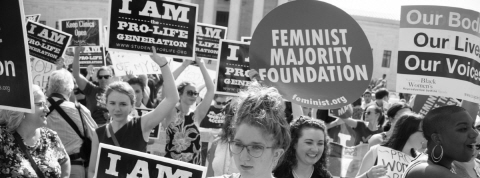
   |
[Debate/토론] (PC-001) Should Abortion Be Legal?
최고관리자 | 17-03-02 23:19

The debate over whether or not abortion should be a legal option continues to divide Americans long after the US Supreme Court’s 7-2 decision on Roe v. Wade declared the procedure a "fundamental right" on Jan. 22, 1973.
Proponents, identifying themselves as pro-choice, contend that choosing abortion is a woman's right that should not be limited by governmental or religious authority, and which outweighs any right claimed for an embryo or fetus. They say that pregnant women will resort to unsafe illegal abortions if there is no legal option.
Opponents, identifying themselves as pro-life, contend that personhood begins at conception, and therefore abortion is the immoral killing of an innocent human being. They say abortion inflicts suffering on the unborn child, and that it is unfair to allow abortion when couples who cannot biologically conceive are waiting to adopt.
Pros
1. The US Supreme Court has declared abortion to be a "fundamental right" guaranteed by the US Constitution.
2. The choice over when and whether to have children is central to a woman's independence and ability to determine her future.
3. Personhood begins after a fetus becomes "viable" (able to survive outside the womb) or after birth, not at conception.
4. Access to legal, professionally-performed abortions reduces maternal injury and death caused by unsafe, illegal abortions.
5. Modern abortion procedures are safe and do not cause lasting health issues such as cancer and infertility.
6. Abortion gives pregnant women the option to choose not to bring fetuses with profound abnormalities to full term.
7. Women who are denied abortions are more likely to become unemployed, to be on public welfare, to be below the poverty line, and to become victims of domestic violence.
Cons
1. Abortion is murder. The killing of an innocent human being is wrong, even if that human being has yet to be born.
2. Life begins at conception, so unborn babies are human beings with a right to life.
3. Abortion is the killing of a human being, which defies the word of God. The Bible does not draw a distinction between fetuses and babies: the Greek word brephos is used in the Bible to refer to both an unborn child and an infant.
4. Abortions cause psychological damage. A 2008 peer-reviewed study published in the Scandinavian Journal of Public Health found that "Young adult women who undergo... abortion may be at increased risk for subsequent depression."
5. Selective abortion based on genetic abnormalities (eugenic termination) is overt discrimination.
6. Women should not be able to use abortion as a form of contraception. It is immoral to kill an unborn child for convenience.
7. If women become pregnant, they should accept the responsibility that comes with producing a child. People need to take responsibility for their actions and accept the consequences.
8. The original text of the Hippocratic Oath, traditionally taken by doctors when swearing to practice medicine ethically, forbids abortion.
DYK
1. From Roe v. Wade in 1973 through 2011, nearly 53 million legal abortions were performed in the United States – an average of about 1.4 million abortions per year. At 2008 abortion rates, three in ten US women will have an abortion before age 45.
2. Although the Catholic and Lutheran churches oppose abortion, more of their members believe abortion should be legal in all or most cases versus illegal in all or most cases (51% vs. 45%, Lutheran; 48% vs. 45%, Catholic).
3. A woman's risk of dying from having an abortion is 0.6 in 100,000, while the risk of dying from giving birth is around 14 times higher (8.8 in 100,000). The mortality rate of a colonoscopy is more than 40 times greater than that of an abortion.
4. 9.3% of abortions reported to the Centers for Disease Control and Prevention in 2011 were undergone by women who had three or more previous abortions.
5. More US state abortion restrictions were enacted between 2011 and 2013 (205 in total) than were adopted during the whole previous decade.
   |




